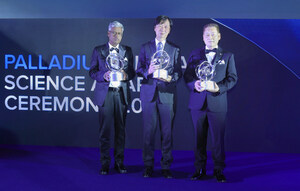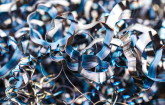
Palladium Global Science Award: Hong Kong Hosts Ceremony Honoring the Most Innovative Palladium-Based Technologies
HONG KONG, Nov. 21, 2025 /PRNewswire/ -- The inaugural Palladium Global Science Award ceremony was held in Hong Kong, celebrating the most advanced innovations in industrial palladium applications. Established in 2025, the international scientific competition aims to stimulate and promote groundbreaking research in new palladium-based technologies. Five scientists from Canada, Japan, India, the United States, and Saudi Arabia were named laureates, sharing a total prize fund of USD 350,000.
The ceremony brought together leading scientists, business representatives, government officials and international partners. Attendees witnessed the formal announcement of the winners and recognized the high level of innovation shaping the future of palladium applications. The event highlighted the global scope of the competition and its role in advancing cutting-edge palladium technologies.
In its first year, the competition received nearly 100 submissions from over 30 countries, covering fields such as traditional and alternative energy, metallurgy, chemistry, nanotechnology, medicine, electronics, and environmental technologies. The International Expert Council evaluated each entry based on scientific novelty, technological feasibility, and industrial applicability.
Winners were recognized in three nominations:
- Best Scientific Developments in New Palladium Applications
- Best Scientific Article in New Palladium Applications
- Best Applied Concept in New Palladium Applications
In the Best Scientific Developments nomination, Distinguished Professor Chao-Jun Li (McGill University, Canada) won first place with a palladium catalyst that converts methane and carbon dioxide into methanol, a key chemical feedstock. This technology reduces greenhouse gas emissions, makes better use of raw materials, and minimizes production waste, creating a more sustainable and environmentally friendly process. Second place went to Distinguished Professor Makoto Fujita (University of Tokyo and Institute for Molecular Science, Japan), who developed a novel method for constructing palladium nanostructures. His work opens the door to materials with unique properties for electronics, medicine, and advanced industrial technologies.
In the Best Scientific Article category, Senior Professor Natesan Thirupathi (Delhi University, India) won first place for his research in organopalladium chemistry that accelerates drug development and makes pharmaceutical production greener. Professor Michael Joseph Krische (University of Texas at Austin, USA) took second place for a method that uses palladium simultaneously for hydrogenation and coupling reactions, speeding up the synthesis of vital medical compounds.
The Best Applied Concept award went to Associate Professor Safa Faris Kayed (Prince Sattam bin Abdulaziz University, Saudi Arabia) for PalladClear, a palladium-based system for wastewater treatment. The device efficiently purifies water, recovers metals for reuse, and reduces environmental impact, which is critical for creating cleaner, safer cities.
"We evaluated not just original ideas, but their real-world impact, where deep scientific insight meets practical implementation. From the very first submissions, it was clear that palladium is moving beyond its traditional uses. We have seen innovations that transform it from a raw material into a strategic, functional resource – ranging from new classes of antimicrobial molecules to precision tools for pharmaceuticals and clean energy. These developments do more than improve existing processes; they create new markets that previously seemed impossible. By recognizing work that combines scientific depth with scalable application, we are setting a standard that can guide global R&D priorities and shape how palladium will be used to tackle the challenges of the coming decades," said Francis Verpoort, Chair of the International Expert Council of the Palladium Global Science Award.
The competition is held with the support of its general partner, the China Precious Metals Industry Committee (CPMIC), as well as Shanghai Metals Market, North-West University (South Africa), and MDX Research Center for Element Strategy (Japan).
The next season of the Palladium Global Science Award will launch in spring 2026. Scientists and engineers worldwide are invited to submit new projects that can transform technology, enhance environmental sustainability, and strengthen the role of palladium in the industry of the future.
SOURCE China Precious Metals Industry Committee (CPMIC)





Share this article